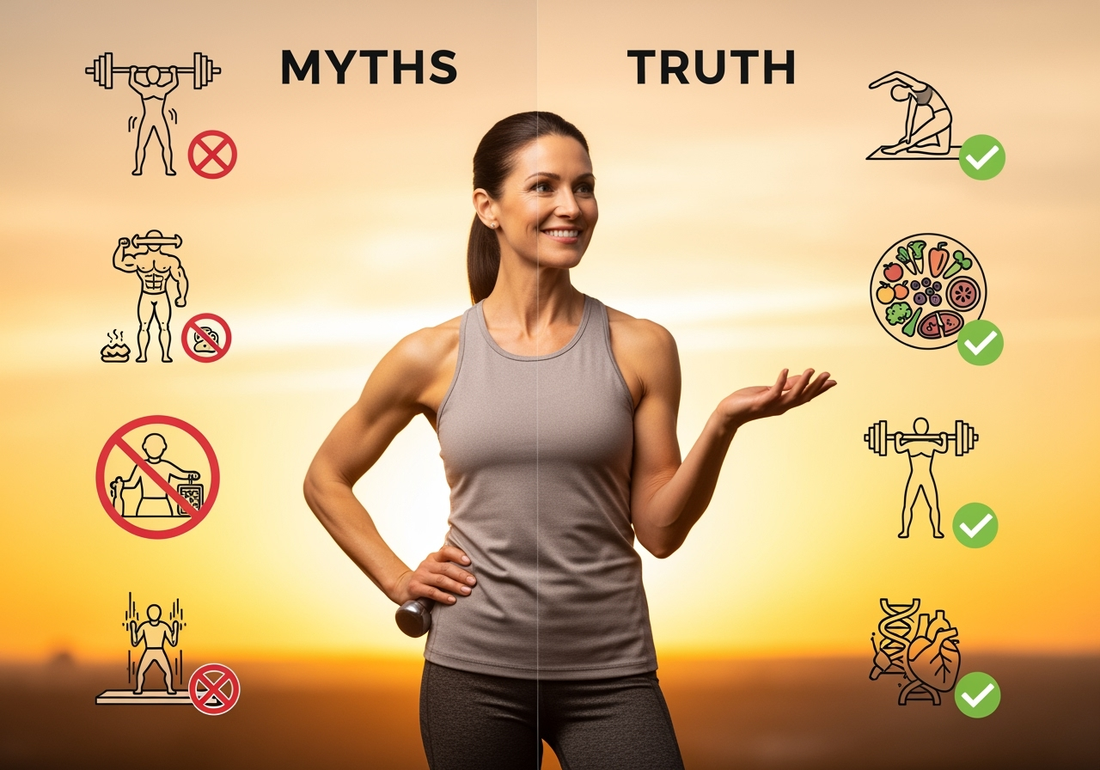
The Truth About Fitness After 40: What Nobody Tells You About Your Changing Body I EP. 3
Share
After 11 days of not being able to keep food down and that scary ER visit, I learned something that changed everything: my body wasn't broken... it was just different. And nobody had told me how to work WITH these changes instead of against them.
The Lies We've Been Told About Fitness After 40
Here's what the fitness industry wants you to believe: "Age is just a number! Train like you're 25! Push through the pain!"
But here's what they don't tell you: Your body after 40 is fundamentally different. Not broken. Not weak. Just different. And when you try to force a 40+ body into a 20-something fitness plan, you're setting yourself up for frustration, injury, and failure.
I learned this the hard way when I ended up in the ER at 10 AM after 11 days of not being able to keep a morsel of food down. My body was screaming at me to pay attention to what was really happening inside.
What's Really Happening Inside Your Body After 40
As an ISSA-Certified Personal Trainer who specializes in women over 40, I now understand the science behind what we're experiencing. Here's the truth nobody talks about:
1. Your Hormones Are Shifting (And That's Normal)
Estrogen decline starts in your late 30s and accelerates through perimenopause. This isn't just about hot flashes... estrogen helps maintain lean muscle mass and controls glucose metabolism. When it drops:
- Your metabolism slows down
- You lose muscle mass faster (up to 8% per decade after 40)
- Fat storage shifts to your midsection
- Your body becomes more insulin resistant
Progesterone and testosterone also decline, affecting your ability to build muscle and recover from workouts.
2. Your Metabolism Isn't "Broken"... It's Adapting
Research shows that excessive exercise can actually contribute to weight gain in perimenopausal women. Why? Because high intensity workouts create more stress on an already stressed hormonal system.
Your body is trying to conserve energy and protect itself. Fighting against this with extreme workouts is like swimming upstream.
3. Your Recovery Needs Have Changed
That workout that used to energize you might now leave you exhausted for days. Your sleep quality affects everything from hormone production to muscle recovery. Poor sleep disrupts the hormones that regulate appetite and metabolism.
Why Traditional Fitness Programs Fail Women Over 40
Let me be brutally honest about what's out there:
High-Intensity Programs (Think F45, Orangetheory)
These programs assume you can handle the same stress load as a 25-year-old. But for women in perimenopause, excessive high-intensity exercise can actually increase cortisol, worsen hormone imbalances, and lead to weight gain.
Generic "Women's Fitness" Apps
Most fitness apps don't account for hormonal changes, varying energy levels, or the need for different types of movement throughout your cycle (even irregular cycles).
Traditional Gym Programs
Built around progressive overload and constant intensity increases. But your 40+ body needs periodization, recovery, and hormone-supportive movement.
Diet Culture Programs
Still pushing restriction and "calories in, calories out" when your body needs nutrient density and metabolic support.
What Actually Works: The Hormone-Smart Approach
After my health scare and becoming a certified trainer, I discovered what actually works for women like us:
1. Strength Training (But Smarter)
- Focus on: Progressive resistance with moderate weights and higher reps
- Why it works: Builds muscle without overtaxing your nervous system
- My approach: 2-3 strength sessions per week with full recovery between
2. Low-Impact Cardio
- Focus on: Walking, swimming, yoga, moderate cycling
- Why it works: Supports cardiovascular health without spiking cortisol
- My approach: Daily movement that feels energizing, not depleting
3. Stress Management as Exercise
- Focus on: Yoga, meditation, nature walks
- Why it works: Lowers cortisol and supports hormone balance
- My approach: Treat stress reduction as seriously as your workout
4. Sleep as Your Secret Weapon
- Focus on: 7-9 hours of quality sleep
- Why it works: Sleep regulates hunger hormones and supports recovery
- My approach: Prioritize sleep over early morning workouts if needed
The Real Results: What Changed When I Stopped Fighting My Body
When I finally started working WITH my changing body instead of against it:
- ✅ Lost 25+ pounds and kept it off
- ✅ Got off all medications
- ✅ Energy levels stabilized (no more 3 PM crashes)
- ✅ Sleep quality improved dramatically
- ✅ Strength and flexibility returned
- ✅ Confidence rebuilt from the inside out
But here's the most important result: I found peace with my body. No more fighting, forcing, or punishing myself.
The Cost of Ignoring Your Body's Changes
Let me ask you this: What's it costing you to keep trying approaches that weren't designed for your changing body?
- Physically: Chronic fatigue, injuries, worsening symptoms
- Emotionally: Frustration, self-blame, feeling "broken"
- Mentally: Constant worry about weight, health, and aging
- Financially: Money spent on programs that don't work
Now imagine: What would your life look like if you had a fitness approach designed specifically for your hormones, your schedule, and your real life?
Your Next Step: Start Working WITH Your Body
If you're ready to stop fighting your changing body and start supporting it, I want to help.
Download my free 2-Day Meal Plan - specifically designed to support hormone balance and metabolism for women over 40. No restriction, no deprivation... just nourishing foods that work WITH your body's needs.
[Get Your Free Hormone-Supporting Meal Plan Here]
This isn't about another quick fix. It's about finally understanding what your body needs and giving it the support it deserves.
Frequently Asked Questions
Q: Is it too late to start if I'm already in my 50s? A: Absolutely not! I work with women in their 50s, 60s, and beyond. Your body is incredibly adaptable when you give it what it needs.
Q: What if I've always been a high-intensity exerciser? A: I understand the fear of "slowing down." But working smarter, not harder, often leads to better results and fewer injuries.
Q: How do I know if my hormones are affecting my fitness results? A: Common signs include: difficulty losing weight despite exercise, extreme fatigue after workouts, poor recovery, sleep issues, and mood swings.
Q: Can I still build muscle after 40? A: Yes! With the right approach, you can build and maintain muscle throughout your life. It just requires a different strategy than what worked in your 20s.
Educational content only. EmpireSun Fitness provides fitness coaching and general nutrition guidance within ISSA CPT scope. This is not medical or individualized nutrition advice. Please consult your physician or a licensed dietitian for personalized care.
